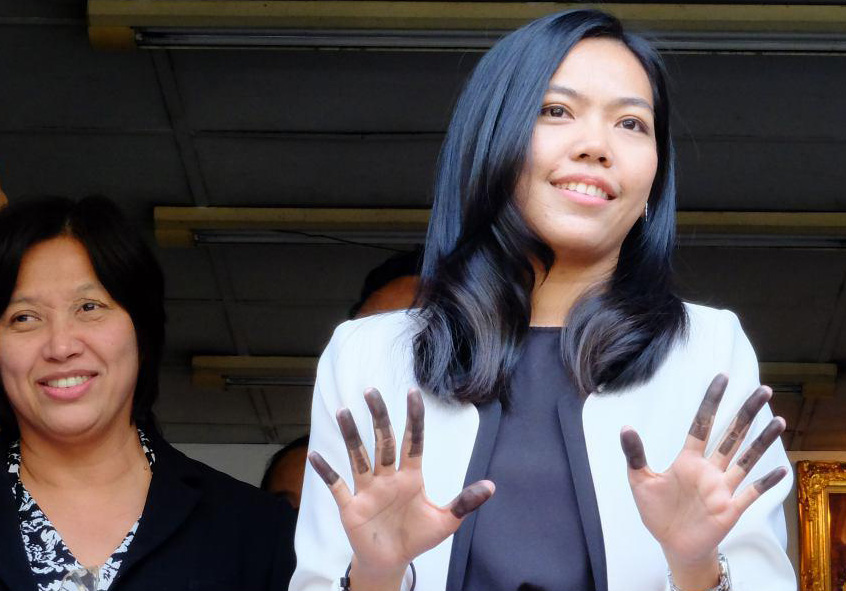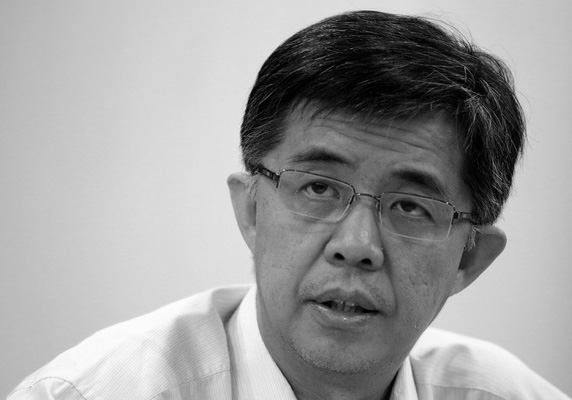
Oct 3, 2016 | News
The government should drop all proceedings against human rights lawyer, Sirikan Charoensiri, including the specious accusation of sedition, which apparently relate to her organization’s representation of 14 student activists peacefully protesting in June 2015, the ICJ and other groups said today.
On 27 September 2016, Sirikan Charoensiri (photo), a lawyer and documentation specialist at Thai Lawyers for Human Rights (TLHR), received a summons from the Thai Police following accusations that she violated Article 12 of the Head of National Council for Peace and Order (NCPO) Order 3/2015, prohibiting the gathering of five or more people for political purposes, and Article 116 of the Thai Criminal Code, a ‘sedition’-type offence.
According to the summons, the accusations are made by an army officer, Lieutenant Colonel Pongsarit Pawangkanan.
Sirikan Charoensiri received the summons, dated 20 September 2016, when she returned to Thailand after attending the 33rd Session of the Human Rights Council in Geneva where she conducted advocacy on the human rights situation in Thailand on behalf of FORUM-ASIA and the ICJ.
Sirikan Charoensiri did not receive an earlier summons, dated 14 September 2016, the police claimed had been sent to her apartment, as she was not home at the time.
Sirikan Charoensiri has already been charged with two offences under the Criminal Code of Thailand: “giving false information regarding a criminal offence” and “refusing to comply with the order of an official” in relation to TLHR’s provision of legal aid to 14 student activists – the new summons appears to relate to the same case.
“The army’s accusation that Sirikan Charoensiri has violated the frequently abused sedition law with its extremely serious penalties and risk of a military trial is indefensible and must be withdrawn immediately,” said Wilder Tayler, Secretary General of the ICJ.
“The fact that the authorities have made these accusations more than one year after TLHR’s clients were charged with sedition in the same case suggest the accusations have been made in retaliation for her high-profile national and international human rights advocacy since the military coup,” he added.
The other groups who signed the statement are: Human Rights Watch, Amnesty International, Asian Forum for Human Rights and Development (FORUM-ASIA), the Observatory for the Protection of Human Rights Defenders (an FIDH–OMCT partnership), Protection International (PI), Lawyers’ Rights Watch Canada (LRWC), Fortify Rights, and the International Service for Human Rights (ISHR).
thailand-sirikan-charoensiri-conviction-news-press-releases-2016-eng (full text in PDF)
thailand-sirikan-charoensiri-conviction-news-press-releases-2016-tha (Thai version, in PDF)

Sep 28, 2016 | News
The conviction of Member of Parliament Tian Chua under the 1948 Sedition Act increases already severe restrictions on freedom of expression in Malaysia, said the ICJ today.
The Malaysian government should drop all charges filed under this law and remove or amend this colonial era law to ensure compliance with international human rights law and standards, the ICJ added.
The Sessions Court in Kuala Lumpur convicted Tian Chua (photo) today under Section 4(1)(b) of the 1948 Sedition Act for allegedly uttering “seditious words.”
The allegedly “seditious words” spoken by Tian Chua were calling on Malaysians to “stand up and fight against racism and corruption.”
Tian Chua spoke these words at a public forum on 13 May 2013 at the Kuala Lumpur and Selangor Assembly Hall.
“Prime Minister Najib Razak promised in 2012 to abolish the 1948 Sedition Act, but until now, this promise has not been fulfilled,” said Emerlynne Gil, ICJ’s Senior International Legal Adviser.
“It now appears that the Malaysian government is holding on to this law to silence political opponents and human rights defenders who express critical views about what is happening in the country today,” she added.
Tian Chua received a penalty of three months’ imprisonment plus a fine of RM1,800 (approximately US$435).
Although he will still be entitled to keep his seat as Batu’s representative to the Malaysian Parliament, his conviction sends a clear and dangerous message that politically critical comments or dissenting opinions from anyone, including a Member of Parliament, will not be tolerated by the government, the ICJ says.
Several other people were also charged for sedition for their speeches at the same public forum where Tian Chua spoke: activists Adam Adli, Hishamuddin Md. Rais, Haris Fathillah Mohamed Ibrahim, and Safwan Anang.
All of them have already been convicted in the past few months under the same provision of the Sedition Act.
“By its very terms, the 1948 Sedition Act contemplates restrictions on the exercise of freedom of expression that are grossly overbroad and inconsistent with the basic rule of law and human rights principles,” said Gil.
The lawyers of Tian Chua, Latheefa Koya and N. Surendran, have confirmed that they will be seeking a stay order on the basis that they will be appealing the sentence and conviction.
The ICJ has repeatedly expressed its concerns regarding the restrictive effect the 1948 Sedition Act has on freedom of expression in the country.
The law criminalizes speech and publications considered to have “seditious tendencies”, a term that is very ambiguously and vaguely defined.
Last year, the ICJ expressed alarm over amendments made by the Malaysian Parliament strengthening the law and broadening its scope, making the “promotion” of hatred between religions an offence.
Contact:
Emerlynne Gil, ICJ’s Senior International Legal Adviser for Southeast Asia, t: +66840923575 ; e: emerlynne.gil(a)icj.org

Mar 30, 2016 | News
The Malaysian government must immediately halt the politically motivated sedition investigation launched by the police against members of the Malaysian Bar who had called for the Attorney General’s resignation, the ICJ said today.
“The Malaysian authorities are using the archaic, colonial Sedition Act to harass and silence lawyers who are demanding that the country’s legal authorities observe international standards of propriety and independence,” said Emerlynne Gil, ICJ’s Senior Legal Adviser for Southeast Asia.
“This latest misuse of the Sedition Act constitutes a brazen political attack on the independence of the country’s lawyers,” she added.
On 29 March 2016, lawyers Charles Hector, Francis Pereira, and Shanmugam Ramasamy, received letters from police authorities summoning them to the Bukit Aman Police Headquarters on 31 March 2016 for the purpose of taking down their statements regarding a complaint filed against them under the Sedition Act (1948).
The three had proposed a motion during the Malaysian Bar’s 70th Annual General Assembly, calling for the resignation of Attorney-General Tan Sri Mohamed Apandi Ali. The motion was passed by a majority vote.
Karen Cheah Yee Lynn, Secretary of the Malaysian Bar, was also notified that her statement would likewise be taken but she was not summoned to the Bukit Aman Police Headquarters.
The Malaysian Bar demanded the resignation of Attorney-General Tan Sri Mohamed Apandi Ali after he summarily ended the investigation of alleged corruption by Prime Minister Najib Razak.
The Prime Minister appointed Attorney-General Apandi on 27 July 2015, in the midst of the corruption investigation.
Attorney General Apandi subsequently cleared Prime Minister Najib Razak of any criminal wrongdoing and instructed the Malaysian Anti-Corruption Commission to close the investigations.
“In 2012, Prime Minister Razak had promised to repeal the Sedition Act, but since then his government has increasingly relied on the law’s impermissibly vague and broad language as a useful tool of repression,” Gil said.
International standards highlight that protecting the independence of lawyers and their professional associations is essential for upholding the rule of law and the administration of justice, the ICJ says.
“This police investigation is clearly designed to challenge that independence,” Gil said.
“The Malaysian Bar has been one of the few institutions consistently defending the rule of law and human rights in Malaysia, and it is crucial to maintain the ability of its members to engage critically in upholding the standards of professional integrity and independence,” she added.
The ICJ urges the Malaysian government to repeal the archaic Sedition Act 1948 and fulfill the commitment it made in 2012 to abolish it.
Unless repealed or considerably revised so that it will be consistent with international law, the Sedition Act 1948 will continue to unduly limit and repress the freedom of expression, not only of lawyers and human rights defenders, but of all Malaysians exercising their fundamental rights, the ICJ says.
Contact
Emerlynne Gil, ICJ’s Senior International Legal Adviser, t: +66840923575, e: emerlynne.gil@icj.org
Background
Under the UN Basic Principles on the Role of Lawyers, governments have the obligation to ensure that lawyers are able to perform all of their professional functions without intimidation, hindrance, harassment or improper interference (Principle 16).
Like other citizens, lawyers are entitled to freedom of expression, belief, association, and assembly. Lawyers have the right to take part in the public discussion of matters concerning the law, the administration of justice, and the promotion and protection of human rights (Principle 23).
The UN Basic Principles on the Role of Lawyers also state that lawyers are entitled to form and join self-governing professional associations to represent their interests and protect their professional integrity (Principle 24).
Governments should ensure that these professional associations are able to function without improper interference (Principle 25).
In its 2016 resolution on human rights in the administration of justice, the UN Human Rights Council unanimously affirmed that “the independence and impartiality of the judiciary, the integrity of the judicial system and an independent legal profession are essential prerequisites for the protection of human rights, the rule of law, good governance and democracy, and for ensuring that there is no discrimination in the administration of justice, and should therefore be respected in all circumstances” (Resolution 30/7, 1 October 2015).
Malaysia’s Sedition Act 1948, originally enacted by the British colonial government and amended times over the years, criminalizes speech and publications considered to have “seditious tendencies”.
The term “seditious tendencies” is ambiguously defined to mean any kind of speech or publication that causes “hatred or contempt, or excite disaffection” against any ruler or the government or promotes “ill will and hostility between the different races or classes”.
The law also considers “seditious” any speech or publication that questions the special privileges of the Malay people, as provided in the Constitution.
Furthermore, sedition is a strict liability offence in Malaysia, which means that the intention of a person allegedly making seditious statements is irrelevant.

Apr 9, 2015 | News
The ICJ today condemned the passing of the amendments to the archaic 1948 Sedition Act by Parliament’s House of Representatives.
The amendments broaden and deepen even further the scope for this law to be abused by authorities in order to violate human rights.
The amendments were passed after a final vote that saw 108 MPs in favour and 79 MPs against the proposal.
“The passed amendments were part of a series of bills that were rushed through Parliament this week, including the draft Prevention of Terrorism Act”, said Emerlynne Gil, ICJ’s International Legal Adviser. “It is unfortunate that Prime Minister Najib Razak has chosen to renege on his promise to abolish the Sedition Act and instead went ahead to make the law worse than it already is.”
“It is undeniable that these amendments would send a further chilling effect on the freedom of expression in Malaysia that is already restricted,” Gil added.
The amendments will now need to be passed by the Senate and thereafter, receive assent of the Malaysian King before it becomes law.
CONTACT:
Emerlynne Gil, ICJ International Legal Adviser, email: emerlynne.gil(a)icj.org or mobile: +66 84 092 3575

Apr 7, 2015 | News
The Malaysian government must cease efforts to strengthen the country’s draconian Sedition Act 1948, which has been used with increasing frequency and severity to suppress and punish criticism of the government, said the ICJ today.
An amendment to Malaysia’s Sedition Act tabled at parliament today would make sedition a non-bailable offence, aggravating the Sedition Act’s incompatibility with international human rights standards.
“The Sedition Act has been used against the government’s political opposition much more frequently than in previous years,” said Emerlynne Gil, ICJ’s International Legal Advisor for Southeast Asia. “Since January 2015, ICJ has recorded at least 36 academicians, lawyers, politicians, students, and activists have been investigated, arrested, or charged under the Sedition Act.”
According to the ICJ, this is a significant spike when compared to the total number of reported sedition cases recorded by Malaysian civil society in previous years: 2010 (5 cases); 2011 (3 cases); 2012 (7 cases); 2013 (19 cases); 2014 (42 cases).
“Instead of repealing or restricting the Sedition Act, the new amendment actually makes it worse by limiting the ability of courts to grant bail to people accused under the Sedition Act,” Gil added.
The amendment specifically states that if the Public Prosecutor certifies in writing that it would not be “in the public interest” to grant bail to the person charged with sedition, the person shall therefore not be released on bail, a matter otherwise normally determined by the courts in each case.
Denying bail based on a mere certificate by the Public Prosecutor removes any requirement that the court be presented with evidence to remand a person in custody and it may also preclude effective inquiry by the court into the lawfulness of the arrest and detention.
“The proposed amendment removes the court’s discretion to determine whether to grant bail or not when presented with a certification from the Public Prosecutor,” Gil said. “It appears therefore that the court has no power to require evidence or even articulation of the reasons to evaluate whether it is reasonable and necessary to remand the person charged with the offence in custody.”
Under international law, the right to seek provisional release before final conviction, for instance through posting bail, is closely linked to the right not to be subjected to arbitrary detention.
Under international standards, a detention that complies with national law can nevertheless be considered arbitrary based on elements of inappropriateness, injustice, and lack of predictability.
In principle, anyone arrested on criminal allegations should have the right to seek release pending trial, including through bail proceedings before a court of law.
National laws should only allow bail to be denied where the facts of the individual case give rise to some specific reasonable ground for continued detention, such as preventing flight, or interference with evidence, or the commission of further violent offences.
Further, where the charges are incompatible with human rights – for instance when it is based entirely on protected freedom of expression – then there can be no basis whatsoever for pre-trial detention. Thus, any detention under the Sedition Act, a vague and ambiguously defined law, would be an arbitrary deprivation of liberty.
Finally, the ICJ recognizes that there have been instances when those arrested under the Sedition Act have allegedly committed acts that are recognizably criminal in character.
In these instances, other criminal laws in Malaysia could provide a proper basis for any investigation and detention.
Contact:
Emerlynne Gil, ICJ’s International Legal Advisor for Southeast Asia: emerlynne.gil@icj.org or +66840923575.
NOTE:
The figures above and the information contained in the chart and graph below are based on ICJ’s documentation in 2015 in comparison with the documentation of reported sedition cases for the past five years done by one of Malaysia’s leading organizations, Suara Rakyat Malaysia (SUARAM).
Malaysia-Graph Sedition Cases 2010to2015-Advocacy-2015-ENG (full graph in PDF)
Malasia-Sedition table 2015-Advocacy-2015-ENG (full ICJ table in PDF)
Malaysia-SUARAM document Overview – Sedition cases 2010to2014-Advocacy-2015-ENG (full SUARAM table, in PDF)









